
With a delegation of over 35 elected officials, including the presence of the political leadership of the Global Taskforce such as Mayor of Hoboken and member of the ICLEI Board of Directors Ravinder Bhalla, a delegation of Kenyan county governors on behalf of ORU FOGAR and Regions4, a strong presence of CLGF members, and local and regional governments from the United States such as the Governor of Hawai’i Josh Green.
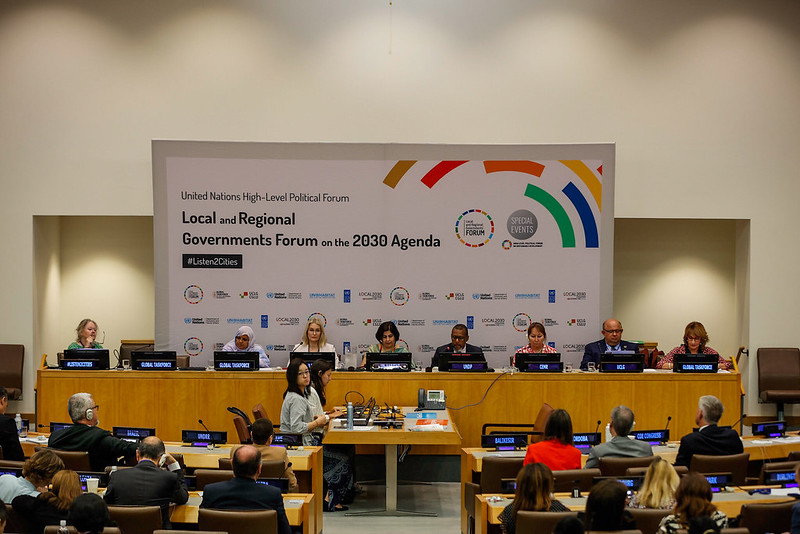 Mayor of Kitchener Berry Vrbanovic; the President of Nouakchott, Fatimetou Abdel Malick; the Mayor of Balikesir Yücel Yilmaz; and Councillor of Telemark and CEMR President Gunn Marit Helgesen, André Viola, Councillor of the Aude Department, Mayor of Toyota Toshihiko Ota, Mayor of Mafra Helder Sousa Silva, Juan Schiaretti, Governor of Córdoba, Wim Dries, Mayor of Genk, Anne-Marie Jean, Vice President of the Eurometropole of Strasbourg, Minister of Foreign Action of Catalunya Meritxell Serret, President of Dagana Ababakar Khalifa Ndao, Anni Sinnemäki, Deputy Mayor of Helsinki, Leonardo Orlando, Prefect of Manabi Province; Luisa Salgueiro, Mayor of Matosinhos, Luis Mariano Fernández, State Secretary for International Relations ot Tucumán, Ricardo Rio, Mayor of Braga, were the delegates of regional constituency gathered in the Global Taskforce of Local and Regional Governments (GTF) participated in the first week of the 2023 High-Level Political Forum (HLPF) contributing to and reporting on the role of local and regional governments in SDG localization.
Mayor of Kitchener Berry Vrbanovic; the President of Nouakchott, Fatimetou Abdel Malick; the Mayor of Balikesir Yücel Yilmaz; and Councillor of Telemark and CEMR President Gunn Marit Helgesen, André Viola, Councillor of the Aude Department, Mayor of Toyota Toshihiko Ota, Mayor of Mafra Helder Sousa Silva, Juan Schiaretti, Governor of Córdoba, Wim Dries, Mayor of Genk, Anne-Marie Jean, Vice President of the Eurometropole of Strasbourg, Minister of Foreign Action of Catalunya Meritxell Serret, President of Dagana Ababakar Khalifa Ndao, Anni Sinnemäki, Deputy Mayor of Helsinki, Leonardo Orlando, Prefect of Manabi Province; Luisa Salgueiro, Mayor of Matosinhos, Luis Mariano Fernández, State Secretary for International Relations ot Tucumán, Ricardo Rio, Mayor of Braga, were the delegates of regional constituency gathered in the Global Taskforce of Local and Regional Governments (GTF) participated in the first week of the 2023 High-Level Political Forum (HLPF) contributing to and reporting on the role of local and regional governments in SDG localization.
Throughout the week, the consistency of the GTF’s partnership with the UN agencies and programmes responsible for monitoring the SDGs in review was evident. This was showcased throughout the recurrent presence of the UN agencies’ principals in different moments organized by the GTF or co-organized with us. Likewise, the GTF proved to be an enduring partner in the UN agencies’ events. It included the participation in GTF events, amongst others, of UN-Habitat’s Executive Director Maimunah Mohd Sharif and Deputy Executive Director Michal Mlynár; the Special Representative of the Secretary-General for Disaster Risk Reduction and Head of the United Nations Office for Disaster Risk, Mami Mizutori, UNDP Administrator Achim Steiner; and the Assistant Administrator Haoliang Xu. A strong political message on SDG localization was shared by the UN Deputy Secretary General Aminah Mohammed. Member States of the United Nations Spain and Brazil showed their commitment to localization and our constituency.
As in all the intergovernmental processes of the year, the constituency’s advocacy efforts have been oriented towards building the case that local and regional governments are committed to achieving the 2030 Agenda and are indispensable political actors, with localization at the center of transformative action. They have claimed SDG 11 as an indispensable accelerator of all SDGs and the opportunity to place urban and territorial equality at the heart of all actions aiming to achieve the SDGs from a human rights perspective.
The number of events organized by Member States and other stakeholders dedicated to localization this week did not go unnoticed. Around 20 training and side events around localizing the SDGS organized including the ones of Malaysia and Mexico. While this is a cause for celebration, it is also a wake-up call to ensure that our spheres of government are always included in localization discussions.
Our constituency contributed to the SDG 11 Synthesis Report, produced by UN Habitat, which highlights that we will not meet most SDG 11 targets without major shifts in urban policy and investments in local government in line with the call of the UN General Assembly to rescue the SDGs. To avoid a collective failure and to rescue SDG 11 but also Agenda 2030 more broadly, actions need to be taken now and at scale across cities and territories.
GTF Report “Towards the Localization of the SDGs” with SDG11 at the center
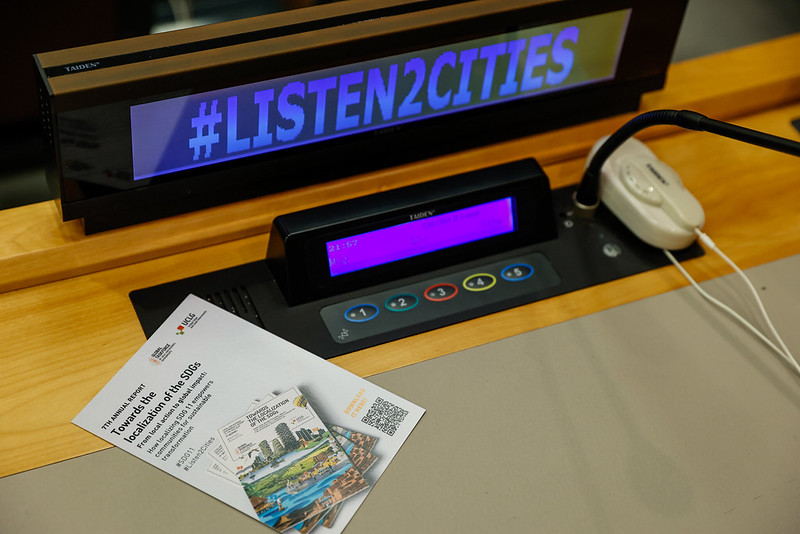 The growth of the localization movement was felt throughout the whole High-Level Political Forum, exemplified amongst others by the exponential growth of the total number of Voluntary Local Reviews (VLRs) available worldwide, with over 240 reports representing a total of 579 million inhabitants. Voluntary Subnational Reviews (VSRs) have also been experiencing a rapid increase, with 37 reports produced since 2020, representing 170,000 local governments and 1.4 billion inhabitants. In turn, Voluntary National Reviews (VNRs) progressively mention these subnational reporting efforts, and some countries include local government associations in the drafting of the reports – although recognition is still not broad and systematic enough.
The growth of the localization movement was felt throughout the whole High-Level Political Forum, exemplified amongst others by the exponential growth of the total number of Voluntary Local Reviews (VLRs) available worldwide, with over 240 reports representing a total of 579 million inhabitants. Voluntary Subnational Reviews (VSRs) have also been experiencing a rapid increase, with 37 reports produced since 2020, representing 170,000 local governments and 1.4 billion inhabitants. In turn, Voluntary National Reviews (VNRs) progressively mention these subnational reporting efforts, and some countries include local government associations in the drafting of the reports – although recognition is still not broad and systematic enough.
As in every HLPF since 2017, our constituency presented the GTF’s “Towards the Localization of the SDGs” annual report. This year’s report includes evidence grounded in the experiences shared through the 199 responses received to the survey this year from local and regional governments and their associations from all world regions. A thorough analysis of the existing +240 VLRs and 37 VSRs has been conducted as the basis for this report, as well as of the updated Country Profiles for SDG localization and the almost 40 VNRs expected for 2023.
The yearly report analyzed the different dimensions of the localization of SDG 11 and it provides bold recommendations at different levels. It demonstrate the manifold ways in which local and regional governments contribute to accelerating progress towards fulfilling SDG 11: by advancing the right to adequate housing; by promoting feminist, accessible and participatory urban planning; by leading climate action and justice; by defending culture as a pillar of sustainable development, and by fostering multilevel governance and balanced urban systems.
The 6th Local and Regional Governments Forum
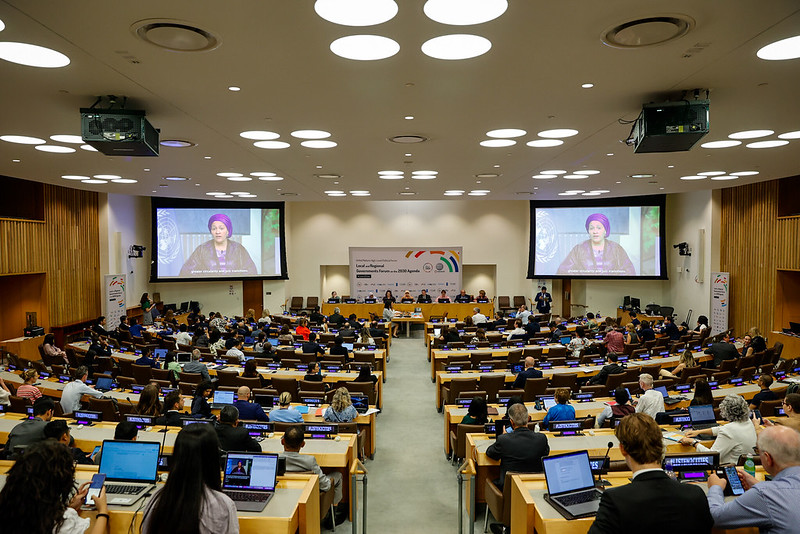
The GTF, together with UN DESA, UN-Habitat, UNDP and the Local 2030 Coalition, convened the sixth Local and Regional Governments Forum (LRGF) at the United Nations Headquarters. The Forum, an official event of our constituency within the HLPF, was the place to raise the voices of local and regional governments as well as to re-emphasize the importance of SDG 11 as a key enabler for achieving the 2030 Agenda; the need to strengthen local public services to address inequalities, promote innovation and foster sustainability; and the role of local and regional governments in the future of production and consumption. Over 20 mayors and governors, together with representatives of Member States, stakeholders, and UN agencies’ principals, gathered in New York for the Local and Regional Governments Forum. The LRGF further consolidated the engagement of the constituency with the HLPF and the 2030 Agenda in a year of particular significance for local and regional governments, ahead of the mid-term review of the 2030 Agenda.
The LRGF was also the moment to present the Joint Statement of the Organized Constituency of Local and Regional Governments to the 2023 HLPF. In it, the constituency called on Member States and the international system to foster a renewed, networked multilateral system, pledging to continue consolidating the LRGF as a space that embodies and strengthens the engagement of the constituency with the HLPF and the 2030 Agenda.
The Local and Regional Governments Day
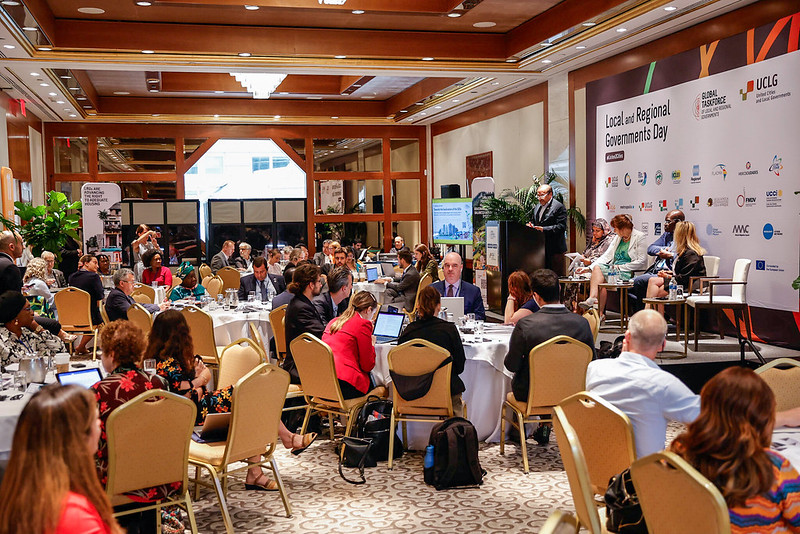 In addition, and as every year, the GTF hosted the Local and Regional Governments Day (LRG Day). It was a moment to bring together representatives from local and regional governments and their networks, international organizations, and the civil society to advocate for a renewed governance structure in which local and regional governments and stakeholders are front and centre.
In addition, and as every year, the GTF hosted the Local and Regional Governments Day (LRG Day). It was a moment to bring together representatives from local and regional governments and their networks, international organizations, and the civil society to advocate for a renewed governance structure in which local and regional governments and stakeholders are front and centre.
The LRG Day presented an innovative format, with an entire segment focusing on high-impact partnerships between the constituency of local and regional governments, the civil society and the UN system. It even addressed the role of the media in reporting on urban issues and their relationship with local and regional governments. Partners such as Global Citizen, Bloomberg Philanthropies, Habitat for Humanity, Slum Dwellers International, IIED, the Carter Center, UNCDF, Cities Alliance, the Guangzhou Institute for Urban Innovation, Women Enabled and Peace in Our Cities gathered in this event.
Finally, the LRG Day launched the VLR-VSR Days, with local and regional governments from all over the world sharing their experiences in developing Voluntary Local and Subnational Reviews. The VLR-VSR Days will continue virtually.
Since the HLPF is supporting the preparations of the SDG Summit in September, which will serve as a mid-term review of all 17 SDGs, many of our actions were oriented to linking the state of localization, high-impact policies and an open and clear commitment to the 2030 Agenda by mayors and governors from around the world.
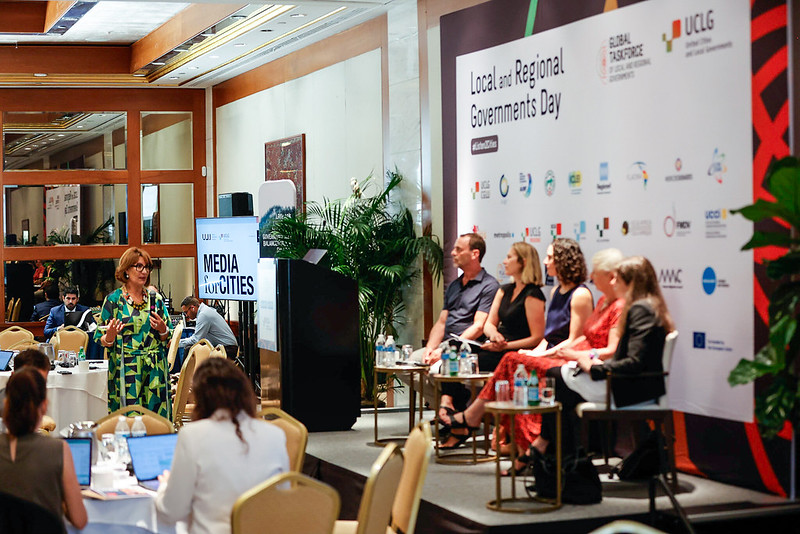
Local 2030 Coalition
The HLPF was also a moment to build upon in order to strengthen the Local 2030 Coalition, of which UCLG is a founding partner. The Local 2030 Coalition has been identified as one of the 12 high-impact initiatives of the SDG Summit, which will take place in September, due to its work on accelerating SDG localization. Within the umbrella of the Local 2030 Coalition as a high-impact initiative, the constituency will have an official space at the SDG Summit: a dedicated event on September 17, which will be the Summit Acceleration Day. This event will be the space to present high-impact policies and coalitions aiming to close the gap and bring localization at the center of the implementation.
At the HLPF, the Local2030 Coalition special event allowed to advance actions, solutions and partnerships to foster multilevel governance and unlock financing to accelerate SDG localization. At the margins of the HLPF, the Steering Committee of the Local2030 Coalition held its second official meeting.
The organized constituency in the follow-up and review of the goals
During the structural participation in the HLPF’s first week it was clear that our constituency is leading the localization movement worldwide through a wide range of high-impact policies contributing to accelerate the 2030 Agenda and all the global development agendas. These commitments are the blueprint of our constituency to achieve the SDGs and our contribution to close the gap in the implementation towards the SDG Summit and the Summit of the Future. The consolidation of this engagement saw a series of high-level moments throughout the week, starting by the direct intervention of the constituency through the Local Authorities Major Group in the Major Groups and other Stakeholders segment.
The constituency of local and regional governments presented its commitment to the SDGs through the Local Authorities Major Group in the official review of SDG 6, which focused on the follow-up to the UN Water Conference and the UN Water Agenda, and of SDG 11, which discussed the lessons learned from the COVID-19 pandemic, and high impact solutions in governance, digitalization, service provision and other policy spheres that could be scaled up to accelerate progress towards SDG 11. As a result of the 2019 political declaration we also took part in the “Transformation from the ground up: Acting at local level” official session.
Other major events
Back-to-back with the official segments and specific milestones of the HLPF, we kicked off the week together with UNDP, the SDG Action Campaign, UN Habitat and AICCRE Venice, to inform the HLPF on the recommendations of the UCLG Local4Action HUB of Venice City Solutions on how local governments are using the SDGs to rethink the city and territory. UCLG and the GTF networks organized around 20 events on practices in the implementation of public policies for the 2030 Agenda and experiences of local and regional governments. We brought the voice of cities and regions on delivering on the SDGs in a moment of geopolitical uncertainty in an event organized by the OECD.
To bring back to the discussions the informal settlements and the pro-poor approach to the SDGs in key areas such as informalities and housing, we co-hosted a discussion together with Cities Alliance and Slum Dwellers International on sustainable cities and communities for all: tools and strategies for leaving no one behind at the subnational level.
Additionally, UCLG and the United Nations Population Fund (UNFPA) signed a historic memorandum of understanding to localize the ICPD30. The memorandum of understanding will promote capacity building and build on common goals and milestones to advance the rights of girls and women in cities and territories from around the world, promoting urbanization, demographic diversity and universal access to family planning, and identifying champions, especially female mayors, to help scaling-up public commitment around the ICPD agenda.
